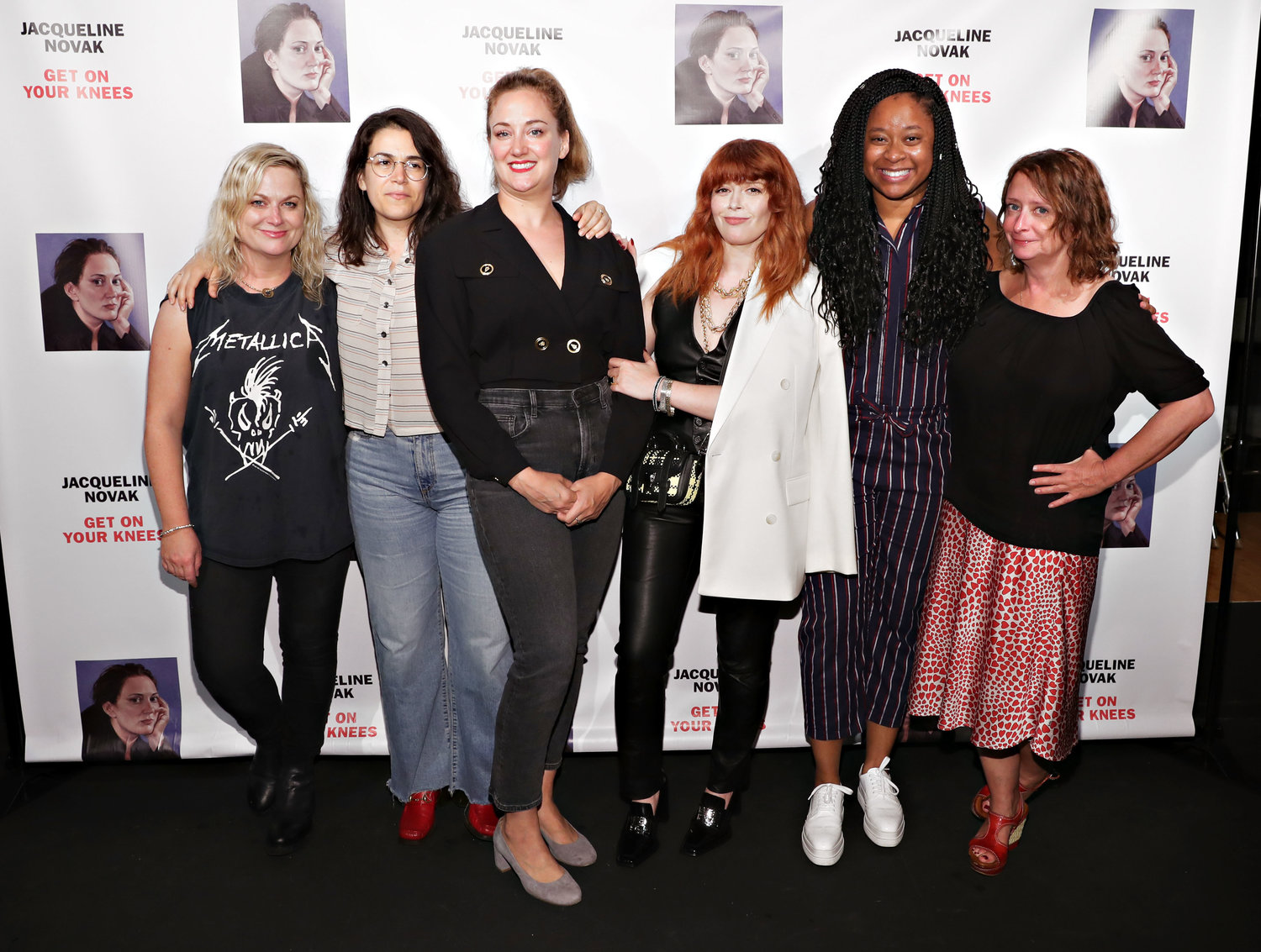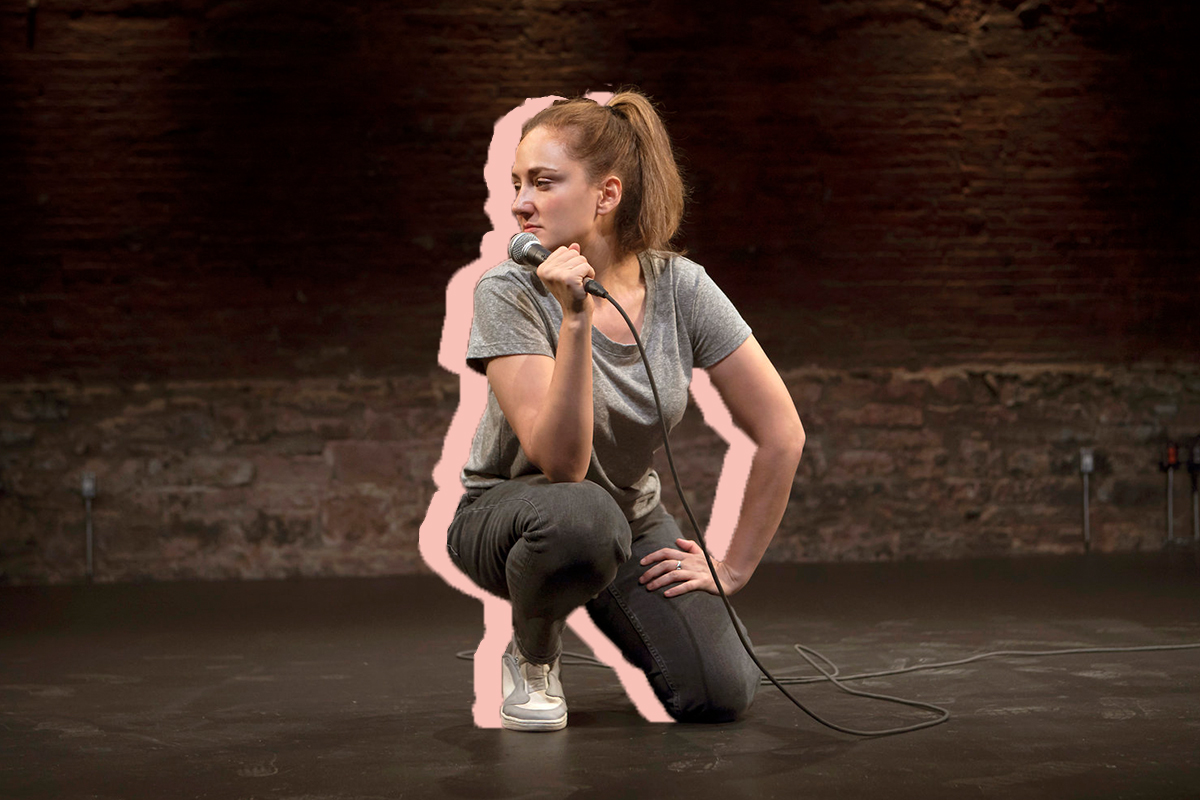Jewish comedian Jacqueline Novak knows her way around a penis.
How do I know? She told me — and the rest of the large audience at Cherry Lane Theater in New York City. In Get On Your Knees, the most sophisticated show you’ll ever see about blowjobs, which Ira Glass called a “nearly Talmudic dissection of a subject,” Novak delivers hilarious, thoughtful, and way too relatable monologues about the art of, you guessed it, fellatio.
And it’s fucking amazing.
I was immersed in Novak’s stand-up/theater mash-up the minute she walked on stage to Madonna’s “Like a Prayer” wearing a groutfit. With sharp similes — like comparing a vagina to a stepped-on rose — and autobiographical experience, the rest of the 80-minute sermon on giving head does not disappoint.

Presented by Natasha Lyonne (!!), produced by Mike Birbiglia, and directed by John Early (if you aren’t familiar with his Britney Spears impression, what’re you doing??), Get On Your Knees was the raunchy, poetic hit of the summer. After selling out at the Cherry Lane Theater, Novak’s thesis on oral sex moved to Lucille Lortel Theatre, where it’s running until October 6. If you’re planning on going, heads up: The audiences have been absolutely star-studded with celebrities like Ilana Glazer, Abbi Jacobson, and Amy Poehler (see above).
Novak is not new to the comedy scene. Her first album, Quality Notions, came out in 2014, and a couple years later she published her first book, How to Weep in Public: Feeble Offerings on Depression from One Who Knows. But Get On Your Knees has permanently stamped the Jewess as a master of elite comedy, a force to be reckoned with, and the expert on blowjob metaphors.
I caught up with Novak to chat about why people think Jewish girls give the best blowjobs, what it’s like working with Natasha Lyonne, and, of course, her Jewish identity.
This interview has been lightly edited and condensed for clarity.
Your show has a lot to do with performance anxiety, and in terms of giving blowjobs, you said that you hate learning on the job. But, as a comedian, isn’t that precisely how you get better at stand-up?
Yes, precisely. That is what’s so hellish about stand-up. My journey with stand-up is not dissimilar from that with the blowjob. Similar anxieties. I draw some of those parallels in the show when I talk about the journey to the microphone being like a journey down the torso.
You roll your eyes at the word “cock.” Why does it bother you?
I love the word cock because I think it’s outrageous. I roll my eyes because it’s a word I associate with constant efforts to coddle a masculine ego. Cock is a suit of armor for the penis.
Okay, so what are your thoughts on “vagina” and “vulva?”
The words vagina and vulva… I’ve never been crazy about. I’m convinced it’s not just “a rose by any other name.” Those words, penis too, are not our best. I say vulva on stage because people often confuse the vagina with the vulva.
That’s so true. So the show is entirely about blowjobs, but how do you feel about cunnilingus?
I don’t have as many thoughts about cunnilingus because it wasn’t a task on my list as a teenager. The show is so much about performance anxiety and coming to terms with that, and I only had that about the blowjob.
How much input did Natasha Lyonne have on the show? What was it like working with her?
Natasha is a soulful genius who is able to pop into the green room and in two minutes give me life altering notes. It’s really wild. She embraced the show as it was, but offered, and continues to offer, really electric insights. And I will follow her to the end of my days.
Wow. That’s beautiful. So legend has it that Jewish girls give the best blowjobs. What do you make of that stereotype?
I’ve never heard that stereotype until doing this show, and a few people have mentioned it. It has the stench of something someone said in the ‘50s in a fetishizing, anti-Semitic way.
Speaking of Jews, do you identify with your Judaism? How has your background influenced your comedy?
My grandfather was a Conservative rabbi in Burlington, Vermont. His daughter, my mom, married a non-Jew. That was a big, bold move. In my mind, the message I internalized was “you love who you love.” Love is more important to follow than group rules, which I think is significant in my worldview.
We celebrated Jewish holidays as well as Christmas, but I didn’t have Jewish schooling. As a result, I identified both with being Jewish and non-Jewish. To the Jewish friends, I wasn’t as Jewish as them. As a non-church goer, I never felt at home in a church. But at the same time, by feeling fully at home nowhere, I kind of feel at home everywhere.
I think experiencing any form of dual identity causes you to ask questions early in life about, er, identity, and perhaps feel resentment of certain closed-mindedness, like Jewish or Christian friends at recess saying: “You can’t be both.” Perhaps it contributes to a sort of questioning of group thinking… which to me relates to a comedic instinct, too. Also, there is a nice history of Jewish comedians that perhaps made me feel on some level at home in the comedy world.
Ah yes, Jews and comedy go together like bagels and schmear. Ultimately, what message do you want your audience to walk away with?
That no one can tell you your story. That you get to write your own narrative. You get to force your life to mean what you want it to mean. And you have a right to defend that. At least, that’s what I think today. Different days I think the show means different things.
Image via Monique Carboni



